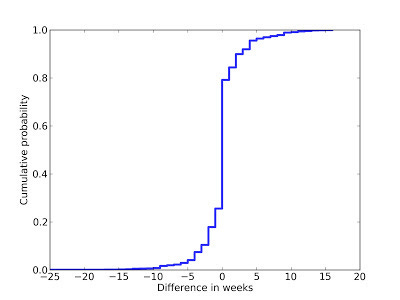Are first babies more likely to be late, revisited.
UPDATE: The version of this article with the most recent data is here.
Two years ago I wrote an article called Are first babies more likely to be late?, based on a question that came up when my wife and I were expecting our first child. I compared the pool of first babies to the pool of all other babies, and found:
There is a small difference in the mean pregnancy length for the two groups, about 13 hours, but it is not practically or statistically significant.
If we group babies into Early, On Time, or Late (where On Time is 38, 39 or 40 weeks), first babies are a little more likely to be Early or Late, and less likely to be On Time.
Then yesterday I got the following question from an Unknown correspondent:
While interesting, I can't help but think you need to compare the first and others for the same woman. While may be unlikely it could still be that a tendency exists for a woman's second, third, etc, child comes earlier.
This is an excellent suggestion. It is possible that the variability between people is masking some of the variability between first and later babies. By pairing first and second babies with the same mother, we can control for variation between mothers.
So I ran that experiment, selecting all mothers with at least two children and computing the difference in pregnancy length between the second and first child (so a positive value means the second child was later). Here is the distribution of these value for 4387 women in the NSFG (National Survey of Family Growth):

Visually the distribution looks symmetric, and the summary statistics support that conclusion. The mean is -0.034, which means that (if anything) the second baby is born about 6 hours earlier, but this difference is not statistically significant.
Conclusion: good question, definitely worth running the experiment, but the primary result is the same as what we saw before: no significant difference in the means.



